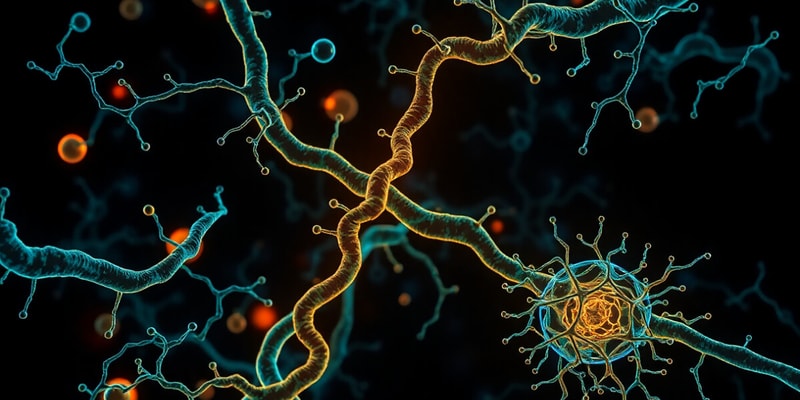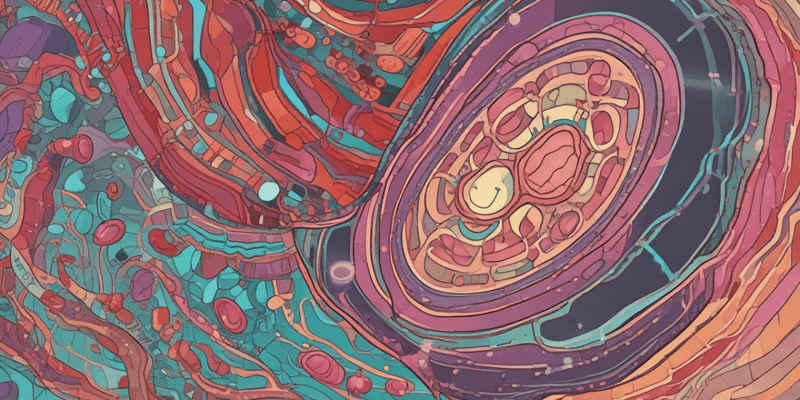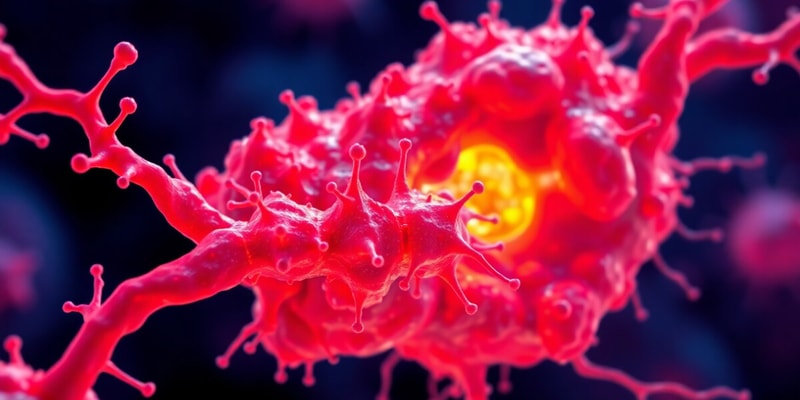Podcast
Questions and Answers
What percentage of mitochondrial proteins are synthesized on cytosolic ribosomes?
What percentage of mitochondrial proteins are synthesized on cytosolic ribosomes?
Where are the majority of mitochondrial proteins encoded?
Where are the majority of mitochondrial proteins encoded?
How many total proteins are estimated to be contained within mitochondria?
How many total proteins are estimated to be contained within mitochondria?
What is the primary mechanism of protein delivery into mitochondria?
What is the primary mechanism of protein delivery into mitochondria?
Signup and view all the answers
Which sub-compartment is primarily targeted for protein delivery in mitochondria?
Which sub-compartment is primarily targeted for protein delivery in mitochondria?
Signup and view all the answers
What is the location where the majority of mitochondrial and chloroplast proteins are synthesized?
What is the location where the majority of mitochondrial and chloroplast proteins are synthesized?
Signup and view all the answers
What happens to the mitochondrial targeting sequence upon entry into the mitochondrial matrix?
What happens to the mitochondrial targeting sequence upon entry into the mitochondrial matrix?
Signup and view all the answers
What is required for mitochondrial import of proteins?
What is required for mitochondrial import of proteins?
Signup and view all the answers
At what temperature is the TS (temperature sensitive) mutant inactive?
At what temperature is the TS (temperature sensitive) mutant inactive?
Signup and view all the answers
Which complex is responsible for the entry of proteins into the mitochondria?
Which complex is responsible for the entry of proteins into the mitochondria?
Signup and view all the answers
What percentage of mitochondrial proteins are encoded by the mitochondrial genome?
What percentage of mitochondrial proteins are encoded by the mitochondrial genome?
Signup and view all the answers
What is the role of the N-terminal mitochondrial localization sequence (MSS)?
What is the role of the N-terminal mitochondrial localization sequence (MSS)?
Signup and view all the answers
Which complex is responsible for transferring proteins across the outer mitochondrial membrane?
Which complex is responsible for transferring proteins across the outer mitochondrial membrane?
Signup and view all the answers
What process assists in the translocation of proteins into mitochondria?
What process assists in the translocation of proteins into mitochondria?
Signup and view all the answers
What happens to the signal peptide upon translocation into the mitochondrial matrix?
What happens to the signal peptide upon translocation into the mitochondrial matrix?
Signup and view all the answers
Which chaperone assists in protein folding after translocation into the mitochondria?
Which chaperone assists in protein folding after translocation into the mitochondria?
Signup and view all the answers
What structural characteristic is common to the N-terminal signal sequence of mitochondrial proteins?
What structural characteristic is common to the N-terminal signal sequence of mitochondrial proteins?
Signup and view all the answers
Which factor helps drive protein translocation through the TOM/TIM pore?
Which factor helps drive protein translocation through the TOM/TIM pore?
Signup and view all the answers
What is the function of the TOM complex in mitochondrial protein translocation?
What is the function of the TOM complex in mitochondrial protein translocation?
Signup and view all the answers
What role does the OXA complex play in mitochondrial protein insertion?
What role does the OXA complex play in mitochondrial protein insertion?
Signup and view all the answers
Which statement accurately describes the protein targeting to chloroplasts?
Which statement accurately describes the protein targeting to chloroplasts?
Signup and view all the answers
During the translocation of outer membrane proteins, what function does the SAM complex serve?
During the translocation of outer membrane proteins, what function does the SAM complex serve?
Signup and view all the answers
How is protein translocation into the mitochondrial inner membrane terminated?
How is protein translocation into the mitochondrial inner membrane terminated?
Signup and view all the answers
What does the TIC complex do during chloroplast protein import?
What does the TIC complex do during chloroplast protein import?
Signup and view all the answers
Which condition is necessary for mitochondrial protein translocation?
Which condition is necessary for mitochondrial protein translocation?
Signup and view all the answers
What happens to the signal sequence of an inner membrane protein after translocation?
What happens to the signal sequence of an inner membrane protein after translocation?
Signup and view all the answers
Study Notes
Protein Targeting: Mitochondria
- Mitochondria contain approximately 1500 proteins
- 99% of mitochondrial proteins are encoded by nuclear DNA, synthesized on cytosolic ribosomes, and imported into mitochondria
- 1% of mitochondrial proteins are encoded by mitochondrial DNA and synthesized in the mitochondrial matrix
Mitochondrial Signal Sequence (MSS)
- 99% of mitochondrial matrix proteins are produced on cytoplasmic ribosomes and contain an N-terminal mitochondrial localization sequence (MLS)
- The MLS is an N-terminal signal sequence
- It is post-translationally cleaved within the matrix
Signal Sequence Receptor
- The TOM complex (translocase of the outer membrane) transfers proteins across the outer membrane
- TIM complexes (TIM23) transfer proteins across the inner membrane
Protein Unfolding and Import
- Proteins unfold to enter mitochondria
- The unfolded protein passes through the translocation channel (TOM/TIM)
- The import receptor of the TOM complex binds the signal sequence of the mitochondrial precursor protein
- Protein is translocated into the matrix with the help of Hsp70 chaperones
- The signal peptide is cleaved
Signal Cleavage in the Matrix
- Signal peptidase cleaves the MSS (mitochondrial signal sequence) in the matrix
- The protein enters the membrane via channels and, cleaved signal peptide
ATP Hydrolysis and H+
- Cytoplasmic and mitochondrial Hsp70 chaperones guide protein import into mitochondria
- Hsp70 chaperones assist in protein folding and translocation, hydrolyzing ATP in the process
- Proton gradient helps drive protein translocation
- Hsp60 chaperone helps fold the protein after translocation and N-terminal signal peptide cleavage
Protein Translocation to Inner Membrane
- Pathway 1: Inner membrane proteins have a hydrophobic sequence after an N-terminal signal peptide which stops translocation at the TIM23 complex. The signal sequence is cleaved, and the protein remains in the inner membrane.
- Pathway 2: Inner membrane proteins are delivered into the matrix through the TOM/TIM complexes. The signal sequence is cleaved. A new N-terminus (recognized by OXA) complex inserts the protein into the inner membrane.
Targeting to the Intermembrane Space
- One way is protein insertion into the inner membrane followed by cleavage of the transmembrane region
Targeting to the Outer Membrane
- Outer membrane proteins (e.g., VDAC porin) are transported unfolded into the intermembrane space by the TOM complex
- The SAM (sorting and assembly machinery) complex inserts the protein into the outer membrane and helps it fold
Protein Translocation Complexes
- TOM COMPLEX: Translocation channel for proteins into mitochondrial matrix
- SAM COMPLEX: Involved in protein assembly and sorting into outer mitochondrial membrane
- TIM22 COMPLEX: Translocates proteins into inner mitochondrial membrane
- TIM23 COMPLEX: Translocates proteins into inner mitochondrial membrane
- OXA COMPLEX: Involved in sorting and insertion of inner membrane proteins
Mitochondrial Localization Sequences (MLS)
- Different signals direct proteins to different locations within the mitochondrion (matrix, inner membrane, outer membrane, and intermembrane space)
- The signals include presequences, cleaved hydrophobic anchors, non-cleavable hydrophobic signals, internal signals, and cysteine-containing signals
Protein Localization to Chloroplasts
- TOC (translocase of the outer chloroplast membrane) transfers proteins across the outer membrane
- TIC (translocase of the inner chloroplast membrane) transfers proteins across the inner membrane
- Signal peptide (N-terminus) directs protein into chloroplasts
Protein Import to Chloroplasts
- Import requires protein unfolding
- ATP and GTP energy drives chloroplast import
- The TIC complex has internal motors for protein translocation
Case Study: Measuring Mitochondrial Protein Import
- Poveda-Huertes et al. (2021) study
- Investigated mitochonrial protein import
- Used temperature-sensitive mutant protein to study import
- Used SDS-PAGE and radioactivity tracing technique
Protein Targeting Summary: Mitochondrial Matrix
- Targeting Signal: N-terminal mitochondrial signal sequence
- Receptor: TOM complex
- Transport Complex: TOM/TIM complex
- Energy: ATP (and proton gradient)
- Protein State: Unfolded
Studying That Suits You
Use AI to generate personalized quizzes and flashcards to suit your learning preferences.
Related Documents
Description
Test your knowledge on mitochondrial protein synthesis and the mechanisms involved in protein importation into mitochondria. This quiz covers various aspects, including the percentage of proteins synthesized, the encoding of mitochondrial proteins, and the role of targeting sequences. Challenge yourself to understand the complexities of mitochondrial function and protein delivery.




